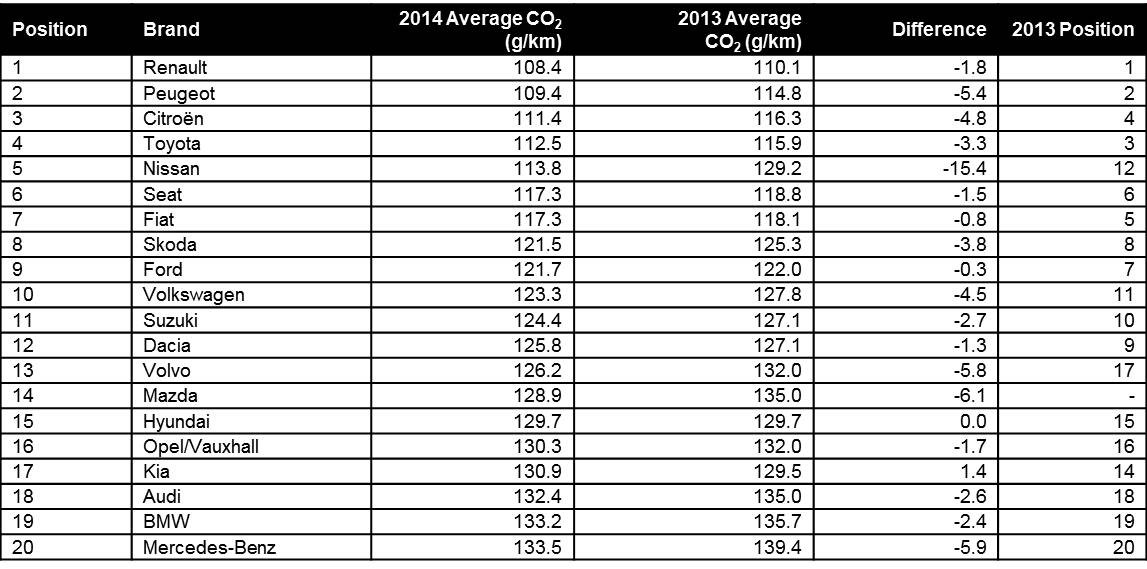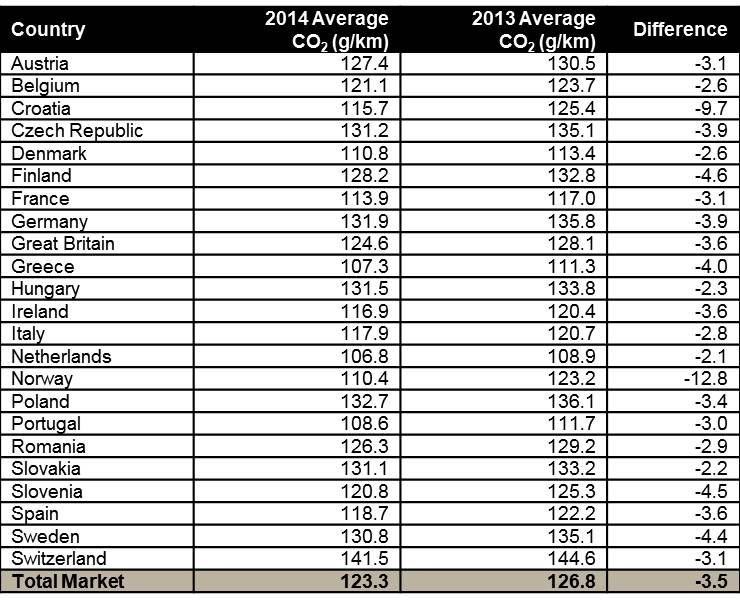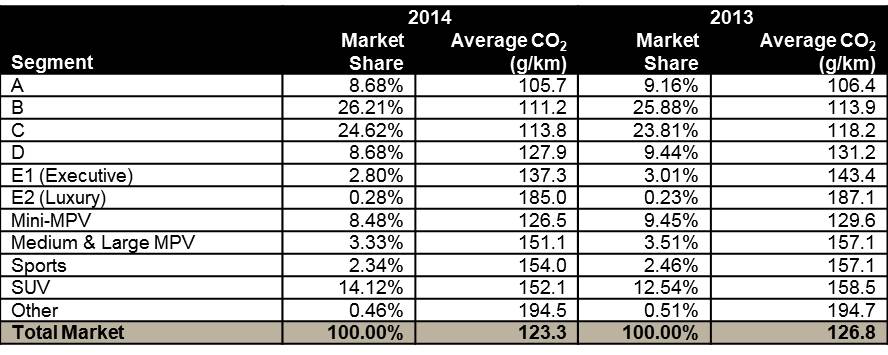Renault continues to lead volume brands as new car CO2 emissions fall across Europe
- Renault claims lowest average CO2 emissions among volume brands in Europe for the second year in a row at 108.4g/km
- The Netherlands records the lowest average CO2 emissions of the 23 countries studied, at 106.8g/km
- Average emissions in Norway fell by 12.8g/km as EV incentives shake up the market
JATO Dynamics, the world’s leading provider of automotive intelligence, today announces that average CO2 emissions from new cars across Europe fell to 123.3g/km in 2014, a 3.5g/km improvement over 2013.
JATO’s headline market analysis:
- Average emissions fell by at least 2g/km in all 23 markets covered by the study
- Renault recorded the lowest average emissions among the top 20 volume brands, ahead of Peugeot, Citroën, Toyota, and Nissan
- Of the top 20 brands, 18 recorded reduced average emissions compared to 2013
- Nissan achieved the best improvement in emissions amongst volume brands
Renault Retains its Lead
Renault recorded average CO2 emissions of 108.4g/km in 2014, a 1.8g/km improvement over 2013, to maintain its position as the brand with the lowest average CO2 emission among the top 20 best-selling volume brands. This manufacturer increased sales of its electric cars, particularly the Zoe to almost 11,000 units, but its performance is down to the impressively low emissions of the 0.9 litre turbo petrol and 1.5 litre turbo diesel versions of the Clio and Captur, and 1.5 litre diesel versions of the Mégane.
Peugeot maintained second place with 109.4g/km. The brands 108 and 208 small cars recorded the low emissions expected of such vehicles, but the standout performance was the reduction to 102.5g/km of the new C-Segment 308 model.
Citroën claimed third place with 111.4g/km, buoyed by improvements to the brand’s performance coming from new 1.2 litre turbo petrol engines in the C4 model, the new 2nd generation of the C1, and strong sales of the new C4 Cactus model at an average of 96.9g/km.
Toyota fell one place to fourth with an average of 112.5g/km, Hybrid versions now accounting for over half of Auris sales and over a third of Yaris sales.
Nissan recorded the greatest improvement in emissions of the volumes brands, down 15.4g/km to an average of 113.8g/km to claim fifth place in the table. This performance was driven by a raft of new models, including the Qashqai, Pulsar, Note and X-trail, all including improved powertrains, which also benefitted the facelift Juke crossover.
Top 20 best-selling brands ranked by average CO2 emissions (volume-weighted)

Note: Mazda was not in the top 20 brands in 2013. MINI was ranked 13th in 2013, but has not achieved top 20 sales in 2014.
Brian Walters, Vice President of Data at JATO Dynamics, commented: “The brands that have recorded the greatest improvements in the past year have either introduced new models, turbocharged engines, or both. This shows the impressive commitment to sustainability brands are putting into their new designs”
Segment Performance
All segments recorded a reduction in average CO2 emissions in 2014 compared to 2013. The SUV segment recorded the greatest reduction of 6.4g/km to achieve an average of 152.1g/km. This was driven by incremental improvements across a number of the segment’s best-selling models, with more substantial improvements from models with revised powertrains (such as BMW’s X3, Honda’s CR-V and Volvo’s XC60), and an increase in sales of Mitsubishi’s plug-in hybrid version of the Outlander.
The Executive segment recorded the next greatest drop in average emissions, led by Tesla’s pure electric Model S which claimed 2.4% of sales in the segment.
Segment CO2 Emissions Breakdown
European Markets
All 23 markets covered by JATO’s investigation recorded a reduction in average CO2 emissions from new cars in 2014 compared to 2013.
The Netherlands, which introduced a revised tax regime to encourage the purchase of low-CO2 vehicles in 2013, recorded the lowest average emissions in 2014 at 106.8g/km, but also the smallest reduction compared to the previous year of only 2.1g/km.
By contrast, Norway, which has put various incentives in place to encourage the purchase of electric vehicles, saw the greatest reduction in average emissions with, a fall of 12.8g/km to 110.4g/km. These incentives led to pure electric vehicles taking a 12.4% share Norway’s new car market in 2014, compared to 0.45% across Europe.
Greece and Portugal joined the Netherlands in recording average CO2 emissions below 110g/km, while ten of the 23 markets recorded average emissions below 120g/km.
Of the markets studied, only Switzerland recorded average CO2 emissions over 140g/km, but the trend suggests the country should record an average below this threshold in 2015.
Brian Walters concluded: “2014 was relatively stable in terms of government initiatives to encourage low-emission cars, Norway excepted. This means the improvement over 2013 came from consistent taxation pressures and manufacturers’ own initiatives to improve efficiency and performance.”
European Markets – The CO2 Winners and Losers

Notes to Editors
- Volume-weighted CO2 emissions are calculated by multiplying the CO2 emissions rating of each car version by the volumes achieved by that version in a given timescale, totalling this product for all versions, then dividing by the total volume of all versions
More Articles
- CO2 emissions rise to highest average since 2014, as the shift from diesel to gasoline continues
- American loyalty for Pickup trucks remains strong despite price increases
- Strong European car market performance continued in July, with highest monthly volume recorded since July 2009
- Tesla most popular global electric vehicle brand between January and September 2017
- Italy Overtook France in January to Become Europe’s Third Largest New Car Market



